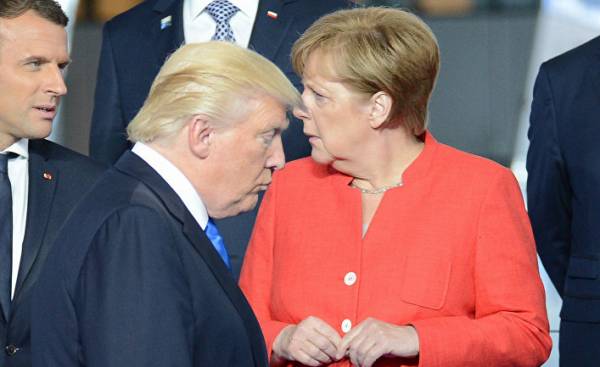
May 28, during a campaign meeting in Munich (Bayern), German Chancellor (German) Angela Merkel stated that “the days when we (member States of the EU) could rely on someone else, have already largely passed.” The German leader also stressed that “the Europeans should really take their own destiny into their own hands.”
These statements by the Federal Chancellor has already caused a wave of mixed reactions from officials, media and expert circles. A number of publications have already called them “slaps” in the address of official Washington and London because of the reluctance to support their “revisionism.” It even prompted the press Secretary of the government of the Steffen Seibert (SPD) further emphasized that “loyalty to Germany transatlantic partnership remains unwavering”. But is it really? Try to understand.
What could cause the discontent of the Chancellor?
The results of the recent informal summit of the North Atlantic Alliance (NATO) in Brussels and the meeting of the “Big seven” (G7) in Sicily was hardly encouraging for Merkel. Almost the main reason for this was “revisionist” position, which was occupied during these events the US President Donald trump and the Prime Minister of great Britain Teresa may.
First, under a barrage of criticism from the American President’s got economic and trade policy of Germany. Ever since the Eurozone crisis 2009-2011 Germany is trying to improve fiscal discipline in the country and, as a consequence, the formation of surplus budgets. The main guide of this policy is the current German Finance Minister Wolfgang Schaeuble. In particular, at the end of last year German Finance Ministry managed to raise to the Treasury on 15 billion Euro more than planned.
The President of the United States, in turn, criticized this approach as one of the non-competitive advantage of Germany in trade with the United States. He was supported by those present in Sicily, the head of the International monetary Fund Christine Lagarde. She indicated in particular that the savings would be used to improve infrastructure (despite the fact that in the US, this problem is more acute). Obviously, Merkel and schäuble for the money other plans.
Secondly, another “annoying” question from Donald trump indicators have been financing Germany defense spending. Over several decades, they steadily decreased. The same trend showed the number of the Bundeswehr and its technical equipment. In 2016 Germany brought the increased defence spending to 1.2% of GDP, or 37 billion euros in financial terms. These figures gave occasion to the President of the United States since the time of the February visit of German Chancellor to Washington to talk about the fact that “Germany was deeply in debt” for collective defense within NATO.
Thirdly, dissatisfaction with the Chancellor’s position caused the President of trump in relation to climate change. Since the second half of the 2000s years, Germany is promoting ambitious environmental policy. Hardly probable not its main element is the “energy turn” (Energiewende). “Turn” implies the renunciation of fossil fuel use and expansion of energy efficiency to counter climate change.
In turn, the current U.S. President during his own campaign called the theory of climate change “global deception”. Therefore, Donald trump considers it appropriate to abandon the Paris climate agreement, which sets ambitious targets for combating global warming. The head of the United States sees it as “brake the American economy.” The US withdrawal may deprive the Agreement of the authority and the financing, because he will be one of the largest economies in the world, which besides, according to world Bank estimates, accounts for 15% of global greenhouse emissions.
Another irritant for Angela Merkel turned out to be extremely fuzzy and the UK position during negotiations. Theresa may was unable to explain to the Chancellor whether the United Kingdom is to pay to the EU budget compensation for the country’s withdrawal from the European Union, which way for market access to the EU Britain would like to have after leaving the Union, and what will be the future of employees — EU citizens working in Britain.
Disappointed with Merkel and the fact that during previous visits trump in the other allied U.S. countries — Saudi Arabia and Israel — a criticism of these countries or their leadership from the American President did not sound. This contrasted sharply with the mood during meetings in Europe, and the fact that the Chancellor is invested in the notion of a “transatlantic partnership.”
That is, the concentration of these extremely complicated issues and probable conviction Merkel that constructive dialogue with Washington in such circumstances is unlikely, it is possible to name critical factors for more severe reaction from the head of the German government.
How unexpected was the reaction of Merkel?
The reaction of Merkel it was difficult to predict. At least because it contrasts with the political style of the Chancellor. This style even led to the emergence in the German language the verb “Tony”, which can be translated as “to speak too carefully, with a minimum of specifics”. Merkel impressed by well-prepared, measured and formulated quite formal language statements which are pronounced in no less formal setting.
This time was radically different everything or almost everything. Of course, it is unlikely that speech in Munich was offhand, but it’s like.
At the weekend the Chancellor spoke of the results of the negotiations the alleged “among other things”, over a glass of beer, and not even at the event of his own party, and for the “fraternal” of the Christian social Union. This, however, has not diminished the effect. After a call to Europe about responsibility and preservation of the unity of sounded very clear and was heard not only in European capitals but also in the world as a whole.
Despite the fact that Merkel in his style did not name any names or countries, all at once guessed who and what was going on. The British Foreign Office even issued a statement in which once again convinced yet that colleagues in the EU and NATO allies that “the withdrawal of Britain from the European Union does not mean withdrawal of the United Kingdom from European Affairs”.
At the same time, the element of surprise is also evident in what the response of leading political forces of Germany to the statement of the Chancellor. In particular, it was supported by even those that belong to parliamentary or extra-parliamentary opposition. One of the leading speakers “Союз90/Green” on foreign policy Trittin said that “the answer to the Trump can only be United and strong Europe”.
Suddenly, with Merkel even sided lipopolysaccha party “Left”. So, her co-chair Katya Kipling in a recent interview with Bild called the President trump “smug narcissist” and “called for an end to the gross dictates of the US in Europe.”
Supported Merkel and the free Democrats, noting the key importance of the European vector of development of modern Germany. In the end, even Martin Schulz agreed with the Chancellor on Twitter, writing that “the best response to Donald trump is a strong Europe” and the foreign Minister, Sigmar Gabriel, called the US position towards Europe “irresponsible”.
“More Europe” in the politics of Germany: what can come of it
At first glance, the statement of the Chancellor can indeed be a breakthrough. However, if you listen it to the end, “the sensational phrase” are skillfully woven into the overall context of German foreign policy.
In particular, after the words about “Europeans taking responsibility for their own destiny” Merkel declares its commitment to the transatlantic partnership.
The head of the German government indicates a willingness to negotiate on various issues subject to the parties values, which is Germany. In this context, even skips mention of Russia. Accordingly, Merkel only adds emphasis, but the essence remains unchanged.
Indeed, since the reunification of Germany, the foreign policy of the “Berlin Republic” has been worn and continues to wear conventionally, the “triune” nature. To these basic vectors are transatlantic cooperation, the European direction and the “Eastern policy”.
With deepening integration in the European Union since the early 1990-ies it is the European dimension is becoming a key to the foreign policy of Germany. In this case, Germany has voluntarily changed its approach to foreign policy in order to ensure the success of the European integration project.
However, the “trigger” changes in East Atlantic areas she was not there. First started to change because of revisionist policies of the Kremlin in Europe and the collapse of democracy in Russia itself.
The importance of the second declined since the mid-1960s and were limited to questions of NATO and the deployment of American military bases. Trump and Brakcet makes it necessary to rethink security as Europe in General and EU in particular, can become almost the main cause of changes in the transatlantic course of official Berlin.
However, the basic trend to European Affairs took on decisive weight, remains invariable, although acquires new features.
On the other hand, such a bold political move, can not affect the political situation in Germany. A number of experts, such as senior researcher at the Royal Elcano Institute, Madrid Ulrich speck, I believe that the thesis Merkel about European solidarity was originally intended for the domestic German consumer. With this thesis we can agree for the following reasons.
First, amid the growing popularity of the populist forces with their “simple and understandable slogans” in society there is a considerable demand for a clear rhetoric. She is expected, in particular, and of the Chancellor. Therefore, we can say that she is these expectations are justified.
Second, in connection with the election campaign Merkel more than ever need to “beat the cards” from the hands of the leading opponents. With this statement the Chancellor dealt a blow at least two arguments of the campaign of the social Democrats.
The first of them — cautious Merkel against the current US administration. Indeed, despite previous contradictory statements of the President of trump, the Chancellor refrained from open criticism. In the latter is mainly practiced by the President-“social Democrats” Steinmeier.
The second concerns the absence of the leader of the Christian democratic vision of prospects of development of Europe. Martin Schulz from the very beginning of the campaign, positions itself as probably the most “European” among the participants of the race. So the statement of Merkel has affected him personally.
The Chancellor was in a better position. She not only stated the requirement to “take more responsibility” for the fate of Europe, but can “put on the table” talks with Emmanuel Macron on deepening integration in the Eurozone and launch of the “multi-speed Europe”,
ignoring the opposition of the SPD within the country and in some Central European States (Poland, Hungary) at the EU level.
However, in order to draw far-reaching conclusions or to believe the start of a “strategic coup” in the framework of the transatlantic vector of German foreign policy, a single statement is not enough.
For this you need to wait at least release the final versions of election programmes to understand, moved these points there or not.
And accordingly, what are the possible consequences of their presence or the lack of activity as of the current Chancellor of Germany, and perhaps the new German government.







